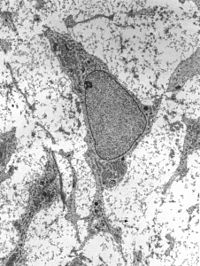
Photo from wikipedia
Tumours are characterized by a state of chronic inflammation and are regarded as wounds that never heal. Mesenchymal stromal/stem cells (MSCs) are being considered as a possible treatment option. While… Click to show full abstract
Tumours are characterized by a state of chronic inflammation and are regarded as wounds that never heal. Mesenchymal stromal/stem cells (MSCs) are being considered as a possible treatment option. While MSCs can regulate the immune system, migrate to sites of inflammation, and are naturally immune-privileged, there have been contradictory reports on the role of these cells in the tumour microenvironment (TME). Some studies have suggested that MSCs promote tumourigenesis while others have suggested the contrary. To better evaluate the role of MSCs in the TME, it may be helpful to understand the role of MSCs in chronic wounds. Here, we discuss the role of MSCs in chronic wounds and extrapolate this to the TME. Chronic wounds are stuck in the inflammatory phase of wound healing, while in the case of the TME, both the inflammatory and proliferative phases are exploited. MSCs in chronic wounds promote a switch in macrophage phenotype from proinflammatory (M1) to anti-inflammatory (M2), thereby suppressing T, B, and natural killer cells, consequently promoting wound healing. In the case of the TME, MSCs are reported to promote tumorigenesis by suppressing T, B, and natural killer cells in addition to dendritic cells, cytotoxic T cells, and Th1-associated cytokines, thereby promoting tumour growth. Some studies have however suggested that MSCs inhibit tumourigenesis, depending on the source of the MSCs and the specific mediators involved. Therefore, the role of MSCs in the TME appears to be complex and may result in variable outcomes. Compelling evidence to suggest that MSCs are an effective treatment option against tumour progression is lacking.
Journal Title: Journal of Immunology Research
Year Published: 2021
Link to full text (if available)
Share on Social Media: Sign Up to like & get
recommendations!